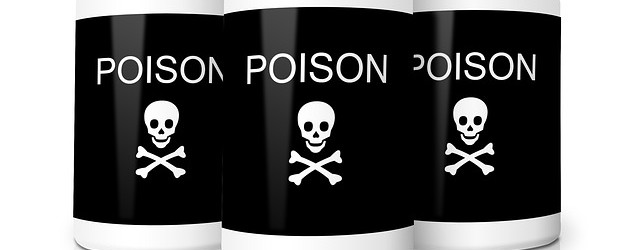Preventing Accidental Poisoning

From our friends at Encompass
Coming in contact with poisons may not be something you think about on a day-to-day basis, but in fact, you are probably in contact with some common household items that are just like poison if handled incorrectly or accidentally ingested.
Medications | This is one of the largest categories for accidental poisonings. Medicines, if taken improperly can often have some of the same effect as taking a poison. Remember these tips:
• Taking a larger-than-suggested dose does NOT mean faster/better results. Stick to the instructions.
• Read the labels before taking – Sounds simple, but so often, we skip this step and could miss information about dangerous drug or food interactions
• Keep medicines in their original bottles/containers – Pill organizers are helpful, but you may forget which medication is which, or leave it where a child could reach it (they are often not child resistant)
• See the light – If you are taking medicine at night, take an extra second to turn on the lights and make sure you have the right dosage and drug
• Keep medicines where kids can’t reach them and keep them separated from food items – child “resistant” doesn’t mean they won’t find a way to get into the container
• Double check the markings on dosage cups/spoons – giving someone the wrong dosage could be harmful
Household Chemicals/Cleaning Products
• Don’t mix cleaning products as you might create toxic fumes
• Be aware of look-alikes. Many non-food products have “twins” that look just like something delicious. See the delicious-looking hard candy on the right? It’s actually a highly concentrated detergent pod. Here are a few other look-alikes to check for in your home:
Plants | As their names suggest, poison oak, poison ivy and poison sumac can cause irritation (sometimes severe) to a person’s skin when they have direct contact. Here are a few more plants that can cause severe reactions if eaten (so do not use for garnish, or in a floral display that is placed near food):
• Narcissus – sometimes confused with onions
• Bittersweet Nightshade – has colorful berries
• Rhododendron (Azalea) – can cause many symptoms including slow/irregular heart beat
Keep the poison control number (800-222-2222) near your phone at home and program it to your mobile phone. If you need to call, stay calm and have details ready: what was taken, when and how much was ingested, and the age and weight of the victim. Everyone is susceptible to poisoning, but children are especially at risk—get a “child’s-eye” view of your home and see what temptations are in their path … then remove them.
